Acne Between Eyebrows: Causes, Treatment, & Prevention Tips
Minimize breakouts up there with some spot treatments and lifestyle changes.
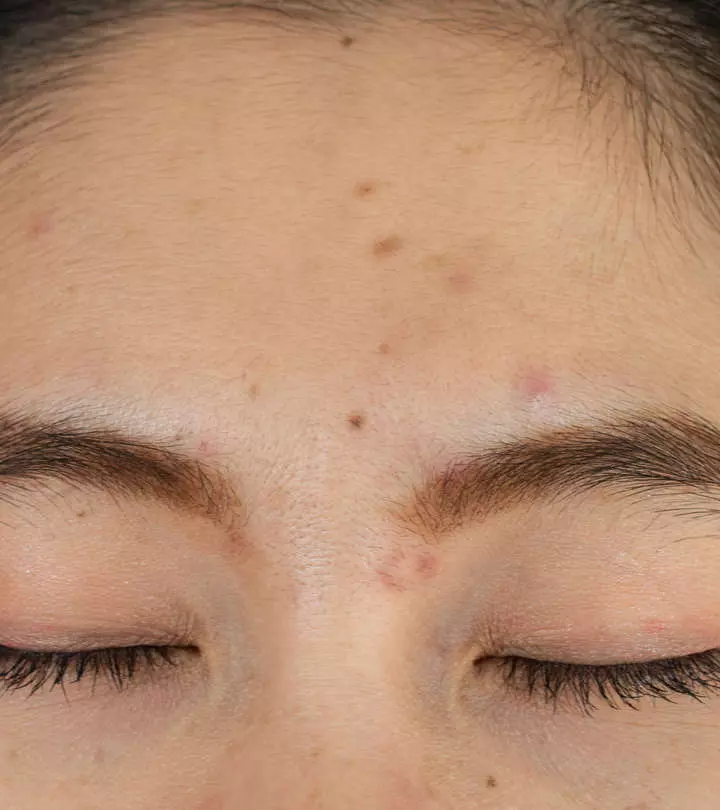
Image: Shuterstock
Eyebrows define your face. But, no matter how much you love them and how well you groom them, pimples between your eyebrows can spoil their appearance and your day.
Your eyebrows are located in a space filled with oil glands and hair follicles that can become clogged with bacteria and dirt. Yes, pimples on the brows can appear at any time due to clogged pores, bacteria, excess sebum production, or underlying health issues. Consult your dermatologist if prescription medications, over-the-counter lotions, and home remedies fail to work on those pimples.
This article will teach you everything you need to know about eyebrow acne, including what causes acne between the brows, how to treat it, how to prevent it, when to see a dermatologist, and everything else in between. Keep reading to know more!
In This Article
Types Of Acne Between Eyebrows
That bump on your brows can be a blackhead, whitehead, papule, or nodule. You can also encounter cystic acne between eyebrows. Here are different forms of acne between eyebrows that can bother you:
- Whiteheads
A whitehead is characterized by a closed white bump on the skin. It forms when a pore or hair follicle gets clogged with dirt, oil, dead skin, or other debris.
- Blackheads
Blackheads are open, black-colored bumps on the skin surface. This mild type of acne occurs because of hair follicles getting blocked by debris, dead skin cells, or bacteria.
- Cystic Acne
Cystic acne
is a large pus-filled bump or an inflamed cyst that is usually red or white. These pus-filled acne flare-ups are caused by inflammation or infections and are painful.
- Papules
appear in the form of red bumps. These inflamed blemishes occur when hair follicles become inflamed due to clogging. Some other reasons behind these blemishes between eyebrows are insect bites and razor burns.
- Pustules
Pustules are larger than papules and characterized by pus-filled lesions. This type of acne is surrounded by red skin and is yellow or white on top. Their root cause is excess production of oil or bacteria.
- Nodules
Nodular acne is characterized by solid, large, and painful lesions that are usually red or skin-toned. These breakouts affect deep layers of the skin. Common causes of this kind of acne are overactive oil glands, clogged pores, genetics, and acne-causing bacteria.
Now, let’s talk about what causes acne between eyebrows.
Key Takeaways
- Different types of acne can appear between eyebrows like whiteheads, blackheads, nodules, papules, pustules, and cystic acne.
- Acne occurs when pores get clogged by excess sebum, hormone and liver irregularities, cosmetic use, and many more.
- Other reasons that cause acne are improper diet, stress, genetics, and oily skin or hair types.
- This condition can be treated by better hygiene practices, medical treatments, and lifestyle changes.
What Causes Acne Between Eyebrows?
If you are wondering what causes acne between the eyebrows, there can be a number of reasons behind it. According to the American Academy of Dermatology, acne develops when pores are clogged (1). They can occur anywhere oil glands are present, including on your scalp and face. So, do not be surprised if you get acne in between your eyebrows. Given below are other potential culprits that lead to acne in this area:
1. Excess Sebum Production
Sebum, a waxy substance produced by the sebaceous gland, promotes skin health.
It protects the skin from moisture loss and also holds the potential to regulate immune responses (2). On the flip side, the overproduction of sebum can clog the pores and encourage acne-causing bacteria. The result is acne, especially the one involving inflammation. So, if you have cystic acne in between your eyebrows, your sebaceous gland’s hyperactivityi A condition where the sebaceous oil glands produce excess oil that gets trapped under the skin and causes bumps. can be the culprit.
2. Ingrown Hair
Regular tweezing, shaving, or waxing your eyebrows can result in ingrown hair, which can eventually trap debris inside the hair follicles. This trapped hair can cause irritation and infection, subsequently giving rise to cystic acne between eyebrows.
3. Cosmetic Use
According to research, there is a potential link between cosmetic use and the severity of acne in young girls (3). Frequent use of comedogenic skin care products can clog the pores and trigger acne formation. The harsh chemicals present in hair styling products and cosmetics can also irritate the skin, giving rise to breakouts.
Moreover, makeup tools like brushes are breeding grounds for bacteria. That means applying makeup with unclean tools can cause persistent acne outbreaks. Even using an old or dirty eyebrow pencil can cause eyebrow acne.
4. Hormonal Changes
Hormonal imbalance
can have a profound effect on the sebaceous glands and lead to an overproduction of oil, which may clog the pores, leading to the development of acne on the eyebrows. These imbalances are common before or during puberty, when you have your period, during pregnancy, and before and during menopause (4). Also, fluctuating hormones can also result from birth control pills and high-stress situations. Hormonal acne is typically distinguished by the presence of painful, inflamed breakouts between the eyebrows and other parts of the face.
5. Liver Malfunction
The ancient Chinese face mapping technique claims that a compromised liver can result in acne between the eyebrows. As the liver is responsible for the body’s detoxification, any kind of toxins from poor dietary habits, alcohol use, and stress can negatively impact this facial area. Inflammatory liver disorders and toxicity in the body can also play a critical role in acne formation. However, there is not enough scientific evidence to prove the same.
6. Manual Hair Removal Methods
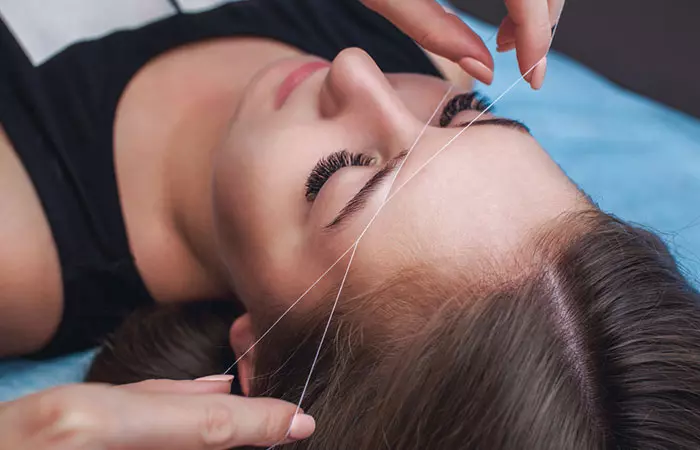
Manual eyebrow hair removal methods like threading, epilating, or waxing can make the eyebrow area susceptible to acne. To prevent such acne flare-ups, clean and exfoliate your eyebrows and try out other hair removal techniques like laser therapy.
7. Fungal Acne
Fungal acne, often called Pityrosporum folliculitis, poses a unique skin care dilemma when it emerges between the eyebrows. It is often misdiagnosed as common acne and may persist for months or years. It is caused by yeast overgrowth and may cause acne-like papules and pustules on the face, especially on the forehead and between the eyebrows. It may also cause redness, itchiness, and red, itchy rashes on the skin.
Apart from these common causes, there could be secondary reasons behind the acne between your brows. Learn more about them in the next section.
Other Reasons Why You See Acne Between Eyebrows
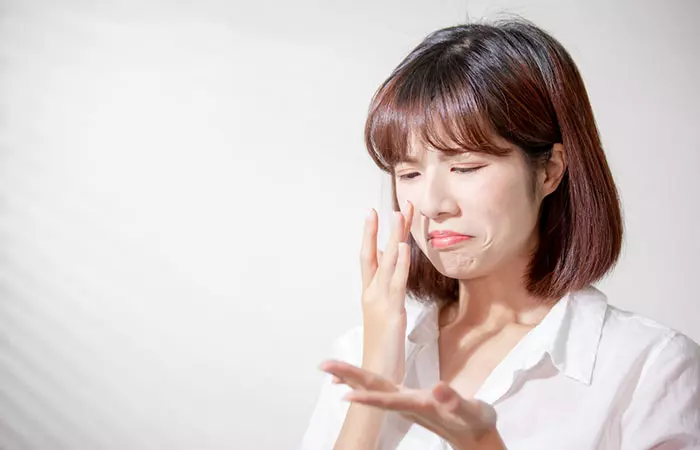
- Diet: A study indicated that there are some foods that can cause acne and worsen the condition (5).
- Oily Skin: Oily skin can have clogged pores that cause acne. Also, if you do not wash your face regularly or properly, it can lead to acne breakouts.
- Oily Hair: Oil from the scalp can transfer to your face and clog your pores, eventually paving the way for pimple formation.
- Genetics: The American Academy of Dermatology says genetics can make adults prone to acne (6).
- Stress Acne: Stress can trigger stress hormones that can stimulate the sebaceous gland and subsequently cause acne.
Now, let’s talk about how you can treat acne between your eyebrows.
Treating Acne Between Your Eyebrows
Want to know how to get rid of acne between the eyebrows and maintain your complexion? Whether you have cystic acne in between eyebrows or non-inflammatory acnei A skin condition characterized by redness and swollen and sore bumps filled with excess oil, pus, and dead skin cells. , certain skin care tips and topical treatments can help you combat them.
1. Cleanse Your Eyebrows Regularly
Following the right cleansing routine can help you prevent those stubborn breakouts. Use a mild cleanser to cleanse your brows twice every day. This will remove debris and build-up and keep acne at bay. Also, exfoliate the brows on the weekends with a gentle scrub.
 Quick Tip
Quick Tip 2. Spot Treatments
Spot treatment with over-the-counter products and topical ointments can help reduce acne. Over-the-counter remedies like benzoyl peroxide and salicylic acid can kill bacteria and clear up clogged pores (7). These treatments work best for mild acne like blackheads or whiteheads.
Wondering how to get rid of acne in between the eyebrows that involve inflammation? An antifungal or steroid ointment can help you in this regard. We recommend consulting a dermatologist before opting for such treatments.
3. Medical Prescriptions
Oral medications like antibiotics and other drugs can help you cope with acne flare-ups. Some oral medications generally given to patients of acne vulgaris include (7):
- Antibiotics: Antibiotics like Tetracycline, Erythromycin, and Macrolide combat acne-causing bacteria and inflammation.
4. Prefer Laser Over Other Hair Removal Methods
To prevent acne breakouts in the first place, avoid shaving, waxing, or plucking your eyebrows. You also may consider laser therapy to reduce hair.
 Quick Tip
Quick Tip5. Count On Medical Therapies And Treatments
Certain medical therapies and skin treatments can be performed to treat breakouts and acne scars between the eyebrows. Are you still wondering how to get rid of acne between the eyebrows? Some of the remedies given below are worth considering (7):
- Chemical Peels: Usually involving AHAs, salicylic acid, or glycolic acid. This treatment improves mild acne and heals acne scars between the eyebrows.
- Laser Therapy: Helps treat inflamed acne. It requires multiple sittings to get the desired results.
- Steroid Shots: Ideal for cystic lesions and nodules. It comes with a handful of side effects.
6. Make Lifestyle Changes

Ditching bad lifestyle practices and following a healthy lifestyle can help you manage your condition. Eat a nutritious diet with plenty of fruits and vegetables that are high in water content. Limit your sugar intake. Refrain from eating dairy, processed foods, and fried foods. And, take care of your body by exercising routinely. Do not forget to keep your stress levels in check.
7. Stick To Home Remedies
Home remedies may be effective in treating acne in some cases. Here is a set of DIY remedies to show you how to get rid of pimples and acne:
- Warm Compress: Take a warm washcloth and hold it against your pimples for 3-4 minutes to reduce the swelling.
- Tea Tree Oil: Mix a few drops of tea tree oil with some coconut oil and use it as a spot treatment (8).
- Aloe Vera: Apply fresh aloe vera gel to the affected region and wash it off after some time. The gel may calm the skin (8).
- Witch Hazel: Boil witch hazel bark in water and strain the liquid. Apply this liquid on acne with a cotton ball and rinse it off after 10 minutes (8).
- Green Tea: Blend green tea powder with Fuller’s earth and water to make a paste. Use this paste as an eyebrow mask (8).
- Apple Cider Vinegar: Mix a tablespoon of apple cider vinegar with 3 tablespoons of water. Apply this solution on pimples and wash it off after 30 seconds.
Avoid getting zits and pus-filled pimples by knowing how to prevent acne the right way. Keep reading to know more.
Prevention Tips For Acne Between Eyebrows
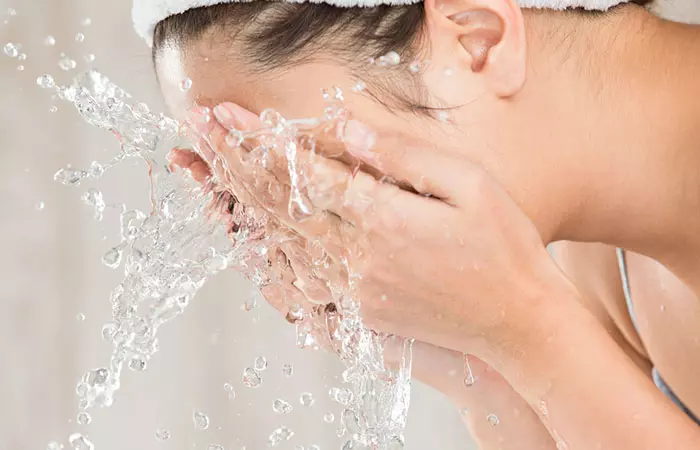
- Cleanse, exfoliate, and moisturize the area around your eyebrows.
- Always use non-comedogenici A property or an ingredient that works without clogging or blocking the skin pores to reduce chances of breakouts. makeup and skin care products. Choose oil-free cosmetics and beauty products, especially if your skin is prone to acne.
- Wash your face at least twice each day. If you sweat, wipe the sweat off using alcohol-free face wipes.
- Keep your hair clean and oil-free. Wash your tresses routinely to keep pimples at bay.
- Meditate to reduce your stress levels. You can also engage in your favorite activities to reduce stress.
- Wash your makeup brushes, sponges, and other tools that come in contact with your brows. Also, keep your head accessories, like headbands, clean all the time.
- Always remove makeup through double cleansing before going to bed. You can use toxin-free cleansing milk or aloe vera gel for the same.
- Make it a habit to wash your pillowcases and bedsheets regularly.
- Stay away from beauty products that contain artificial colors or fragrances.
- Do not scrub your face with gritty scrubs, washcloths, and harsh fabrics.
- If you have pimples, do not pick or pop them as this can worsen your condition.
Also, you can prevent ingrown eyebrow hairs to eventually prevent acne formation. You can do this by:
- Exfoliating before tweezing or waxing your brows.
- Using clean and disinfected tweezers/razors every time.
- Cleansing the eyebrow area before any hair removal method.
- Moisturizing the eyebrow area with an oil-free lotion after grooming your eyebrows.
If you don’t notice the acne between your brows reducing despite taking measures, you may need to consult a doctor. Find out when you should do that in the next section.
When To See A Dermatologist
Although most cases of acne can be handled with the help of over-the-counter products and medications, medical help becomes a necessity sometimes. If you have inflamed acne or a predisposition to acne, seeking a doctor’s help is recommended. Your dermatologist or aesthetician will examine your condition and then suggest more effective treatments.
So, if you have cystic acne and other such lesions, or your acne does not stop, contact a dermatologist.
Infographic: The Right Way To Cleanse Your Eyebrows
Washing your face is not enough to prevent the stubborn acne that occurs between your eyebrows. You need to clean your eyebrows regularly and exfoliate them at least once a week to reduce the acne breakouts between your eyebrows. However, you must know the right way to cleanse your brows.
Check out the infographic below for a step-by-step guide to cleansing your eyebrows properly. Illustration: StyleCraze Design Team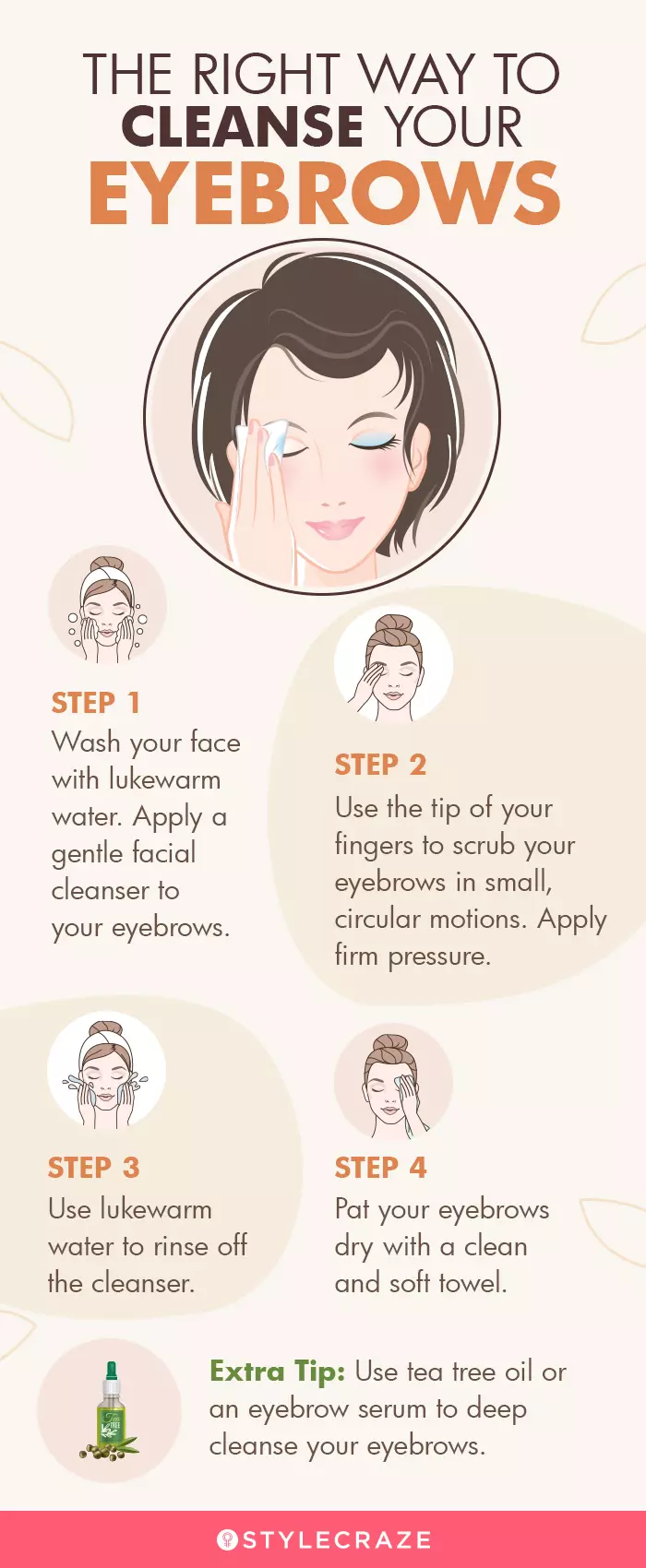
Acne between the eyebrows is not an uncommon condition. It can occur due to several reasons like hormonal changes, excess sebum production, clogged pores, and bacterial growth. You can treat this condition through home remedies, over-the-counter creams, and medications. There are also medical procedures like laser therapies or steroid shots that help treat acne between the eyebrows. The tips mentioned in the article will also help you prevent these breakouts. Keeping your hair clean and oil-free, changing the pillowcase regularly, not using makeup products with fragrances or artificial colors, etc., will help you stay away from acne breakouts. Consult a dermatologist if the issue persists.
Frequently Asked Questions
What does forehead acne mean?
Forehead acne may be caused by certain hair care products you use. It can also be caused due to excessive sweat or dirt build-up. It could also mean that you are stressed or undergoing hormonal fluctuations.
What vitamin deficiency causes forehead acne?
According to a study, Vitamin D deficiency can be a cause of forehead acne. The study showed that Vitamin D deficiency was more prevalent in acne patients, and vitamin D levels were negatively correlated with acne severity (9).
Which hormone causes acne on the forehead?
Androgens are one of the main hormones that cause acne. Additionally, hormones like testosterone, Dehydroepiandrosterone Sulfate (SDHEA), and Dihydrotestosterone (DHT) stimulate sebaceous gland growth and sebum production, leading to increased development of acne (10).
Does drinking water help with forehead acne?
There is no scientific evidence to prove that drinking water directly helps reduce forehead acne. However, drinking enough water may improve skin hydration (11), which then may manage and prevent acne.
Learn how to remove acne between your eyebrows. Check out this video to understand the causes, treatments, and prevention tips to remove them from between your eyebrows quickly and easily.
References
Articles on StyleCraze are backed by verified information from peer-reviewed and academic research papers, reputed organizations, research institutions, and medical associations to ensure accuracy and relevance. Read our editorial policy to learn more.
- ACNE: WHO GETS AND CAUSES
https://www.aad.org/public/diseases/acne/causes/acne-causes# - Sebaceous-immunobiology is orchestrated by sebum lipids
https://www.ncbi.nlm.nih.gov/pmc/articles/PMC5821166/ - Relationship between acne vulgaris and cosmetic usage in Sri Lankan urban adolescent females
https://pubmed.ncbi.nlm.nih.gov/28941014/ - ADULT ACNE
https://www.aad.org/public/diseases/acne/really-acne/adult-acne - The relationship of diet and acne
https://www.ncbi.nlm.nih.gov/pmc/articles/PMC2836431/ - Adult Acne
https://www.aad.org/public/diseases/acne/really-acne/adult-acne - Management of acne
https://www.ncbi.nlm.nih.gov/pmc/articles/PMC3080563/ - Medicinal Plants for the Treatment of Acne Vulgaris: A Review of Recent Evidences
https://www.ncbi.nlm.nih.gov/pmc/articles/PMC4740760/ - Association Between Vitamin D Level And Acne, And Correlation With Disease Severity: A Meta-Analysis
https://pubmed.ncbi.nlm.nih.gov/34348293/ - Adult Female Acne: A Guide To Clinical Practice*
https://www.ncbi.nlm.nih.gov/pmc/articles/PMC6360964/ - Does Dietary Fluid Intake Affect Skin Hydration In Healthy Humans? A Systematic Literature Review
https://pubmed.ncbi.nlm.nih.gov/29392767/
Read full bio of Dr. Jeffrey T. S. Hsu
Read full bio of Arshiya Syeda
Read full bio of Ramona Sinha
Read full bio of Monomita Chakraborty






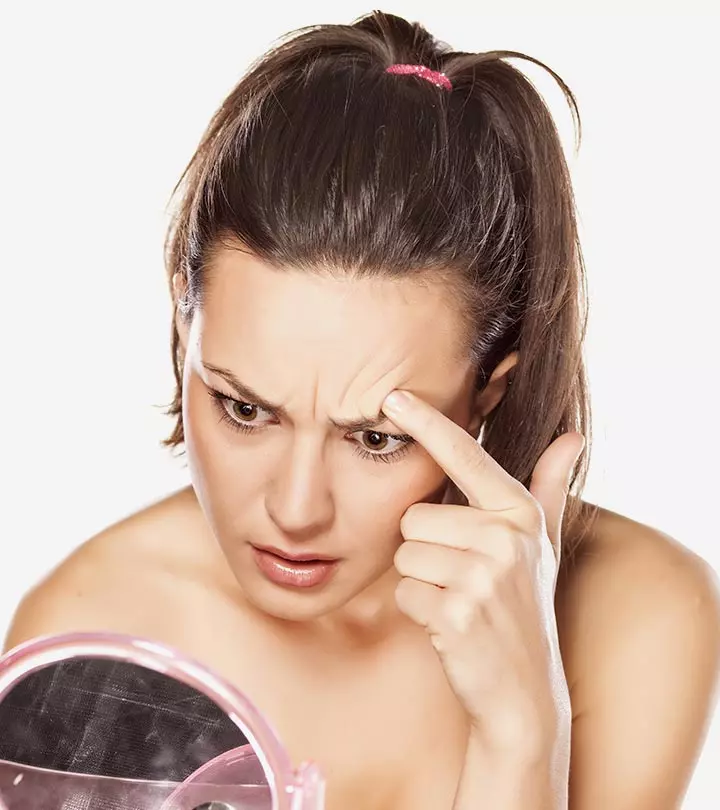
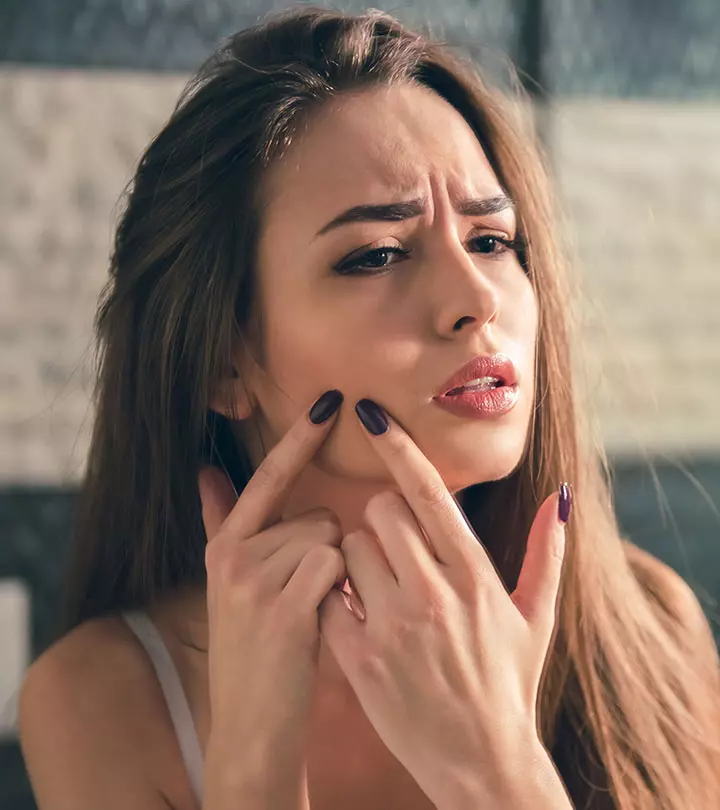
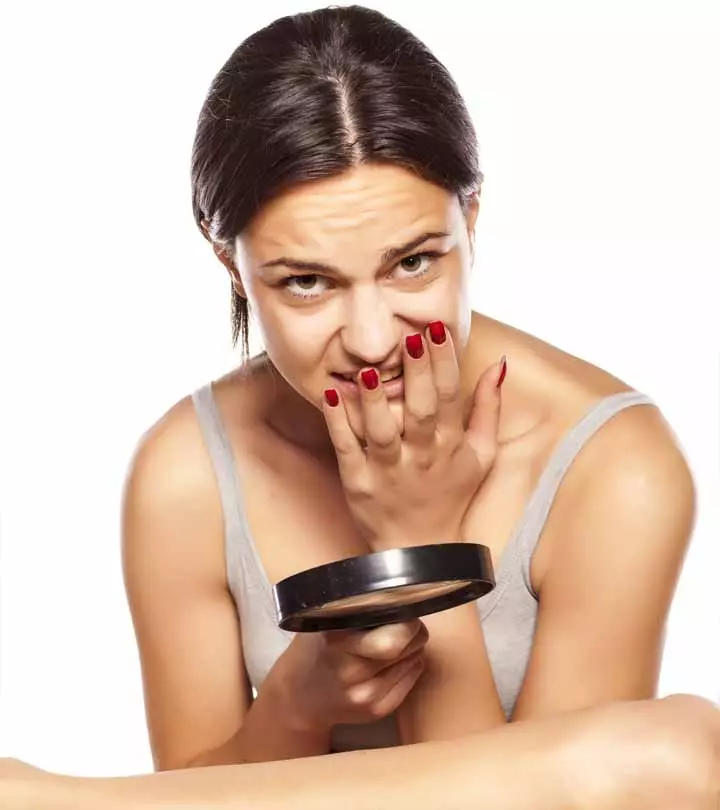

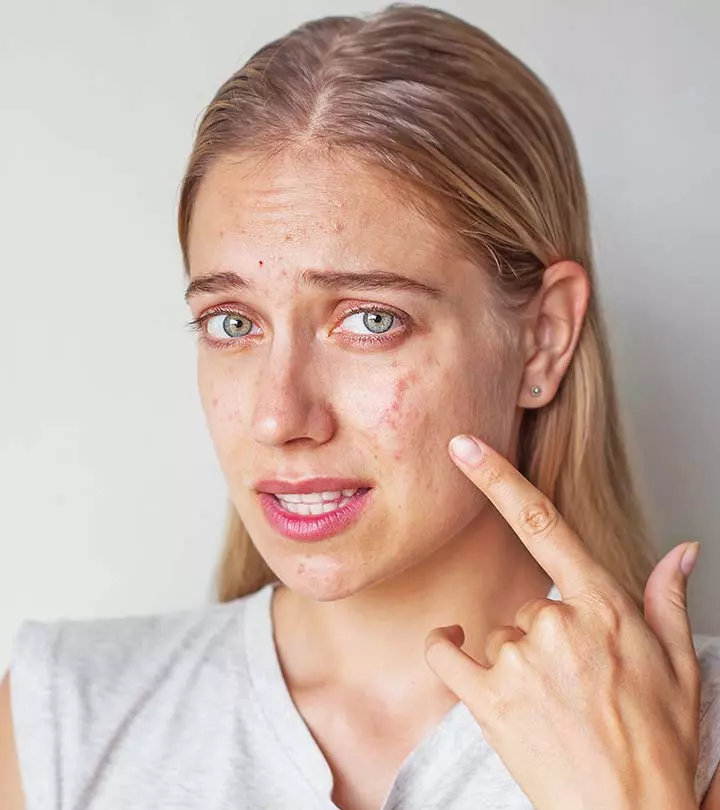
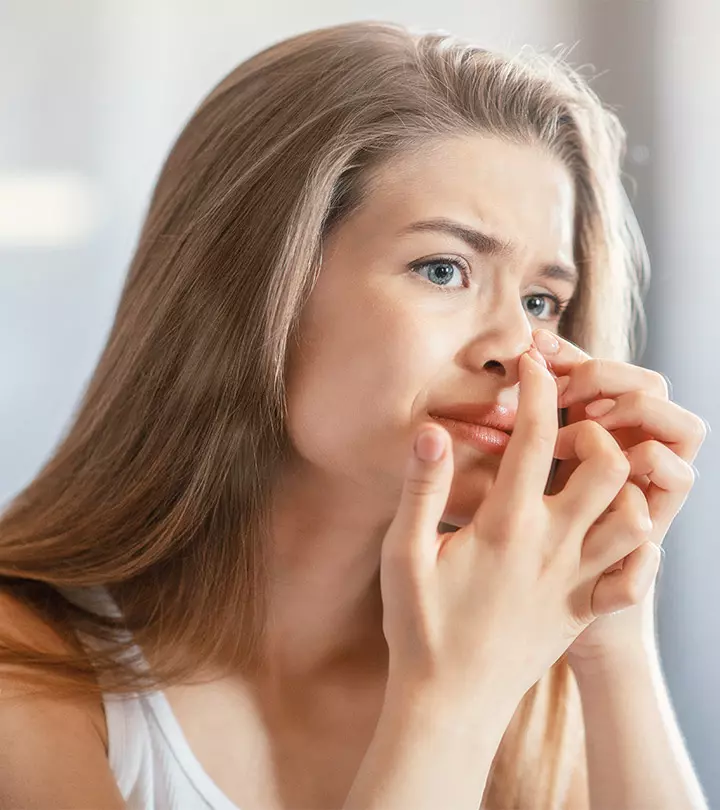

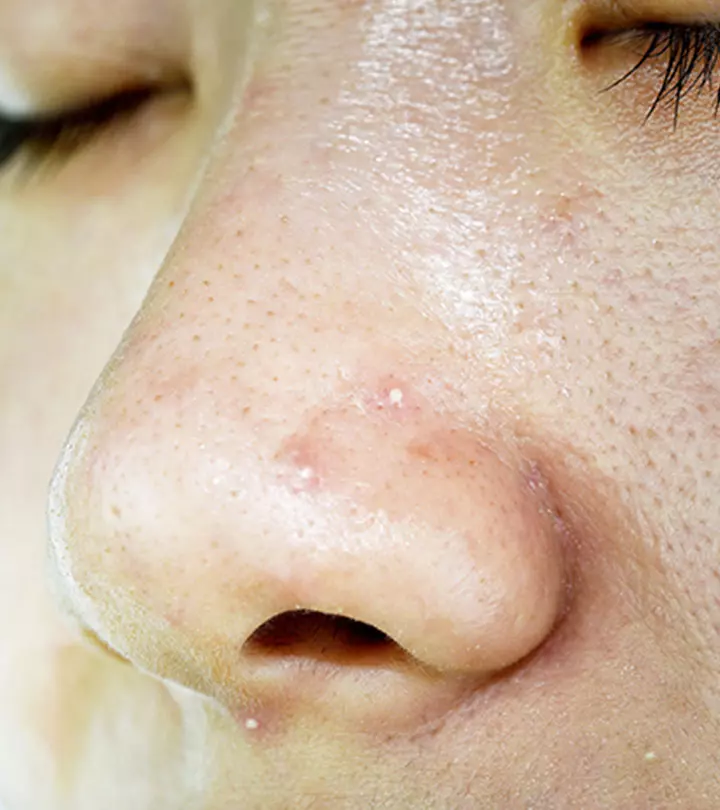
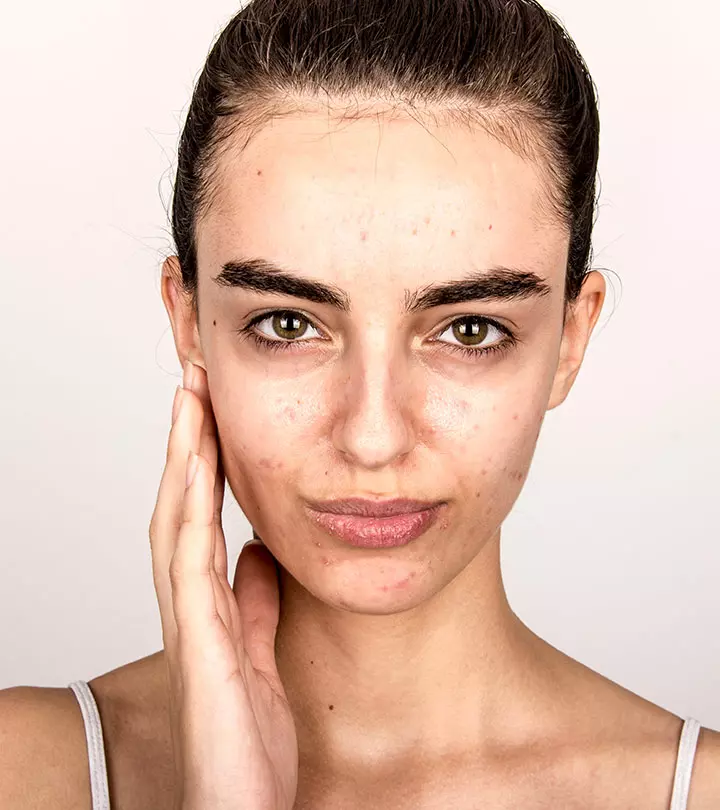
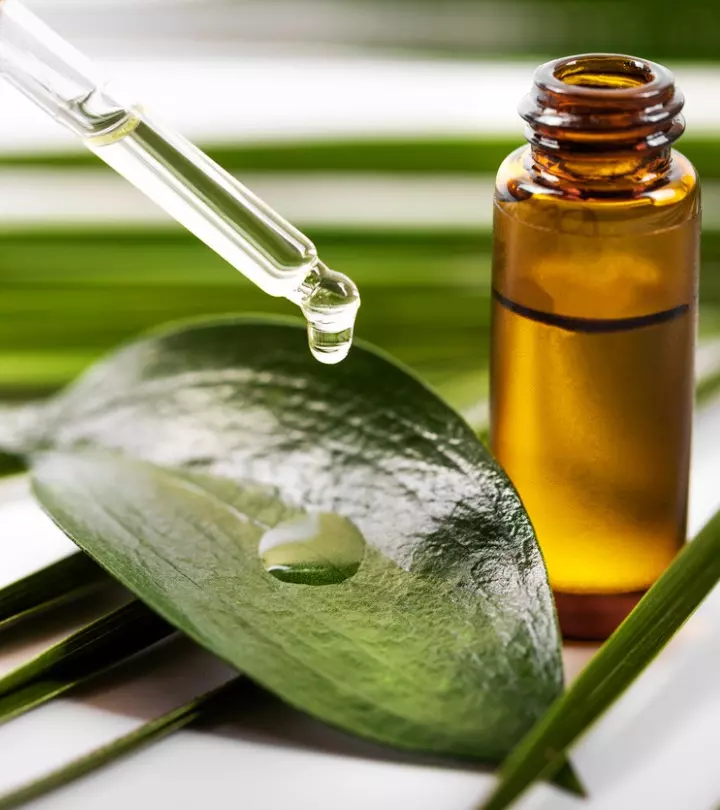
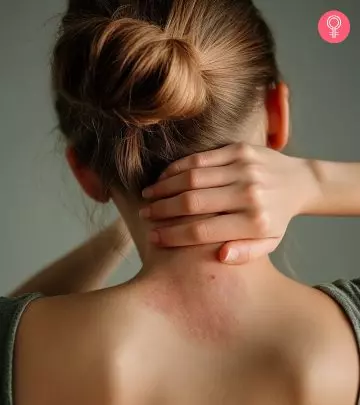
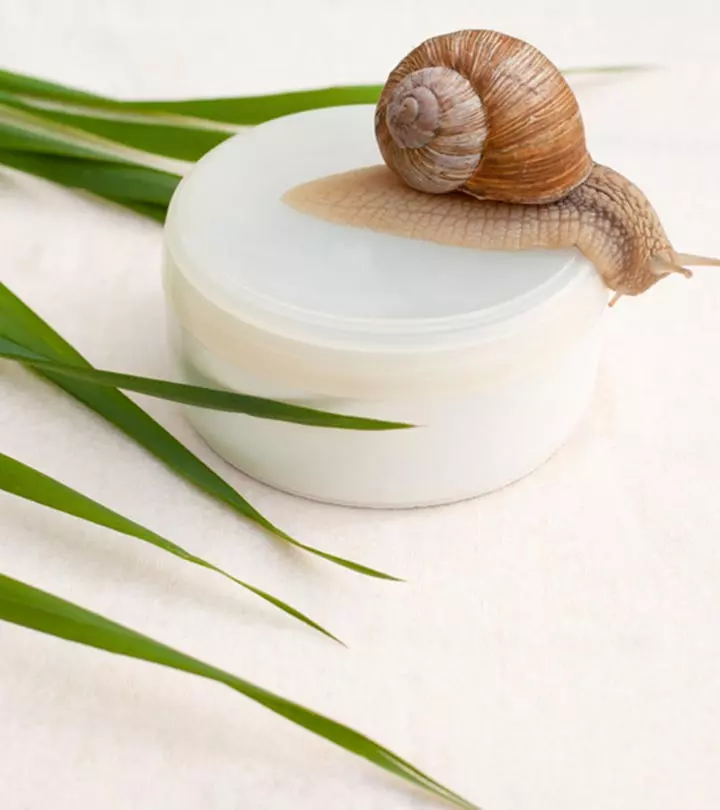
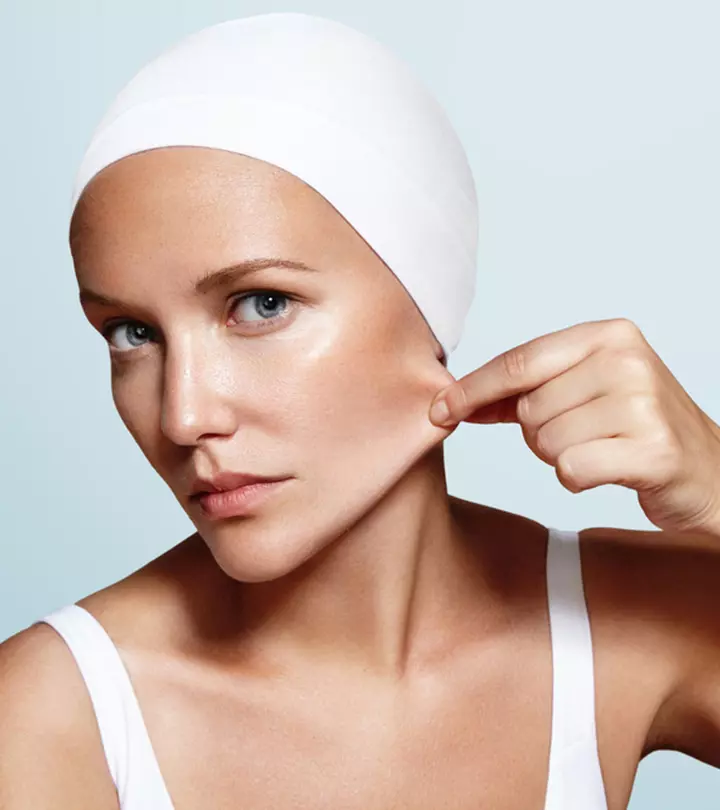
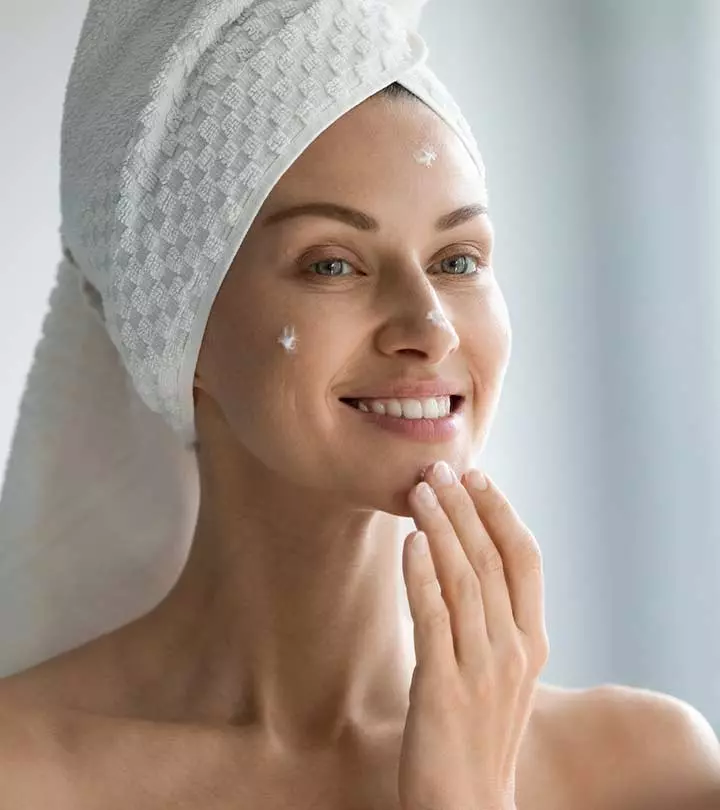
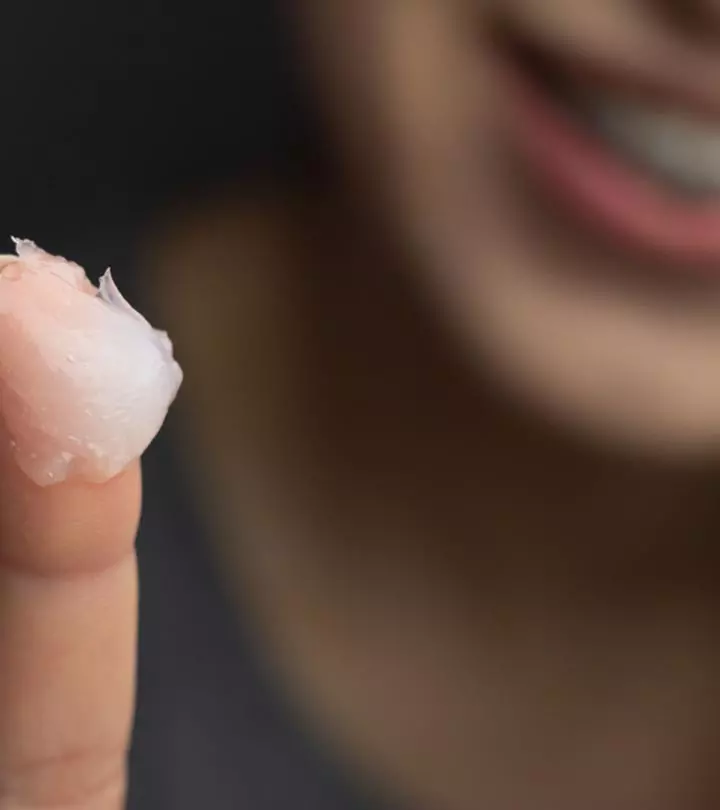
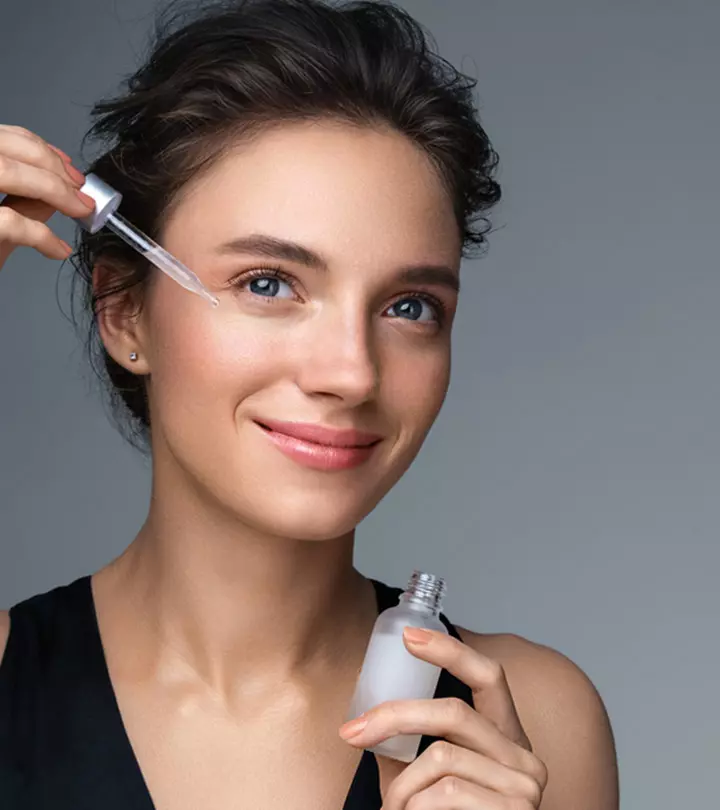
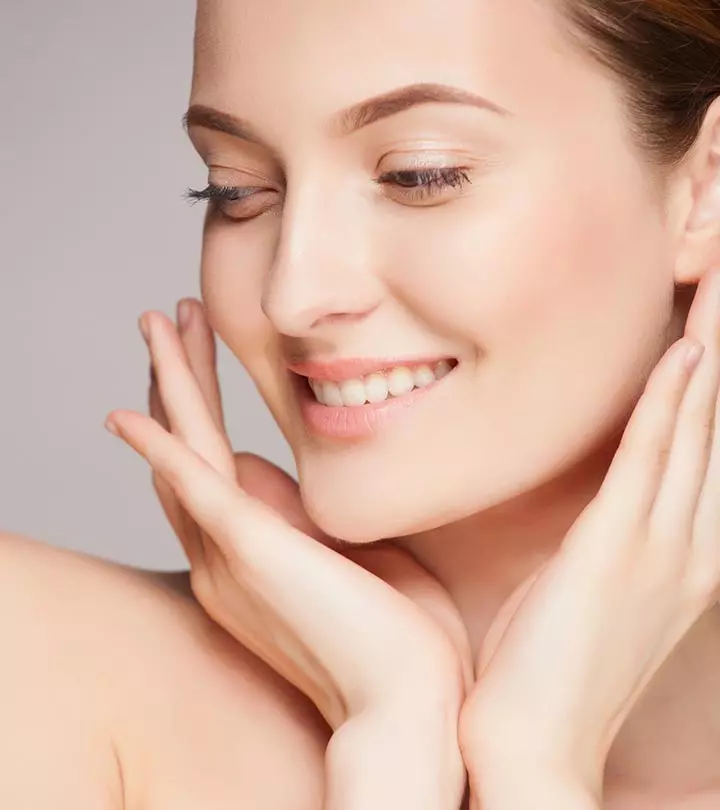
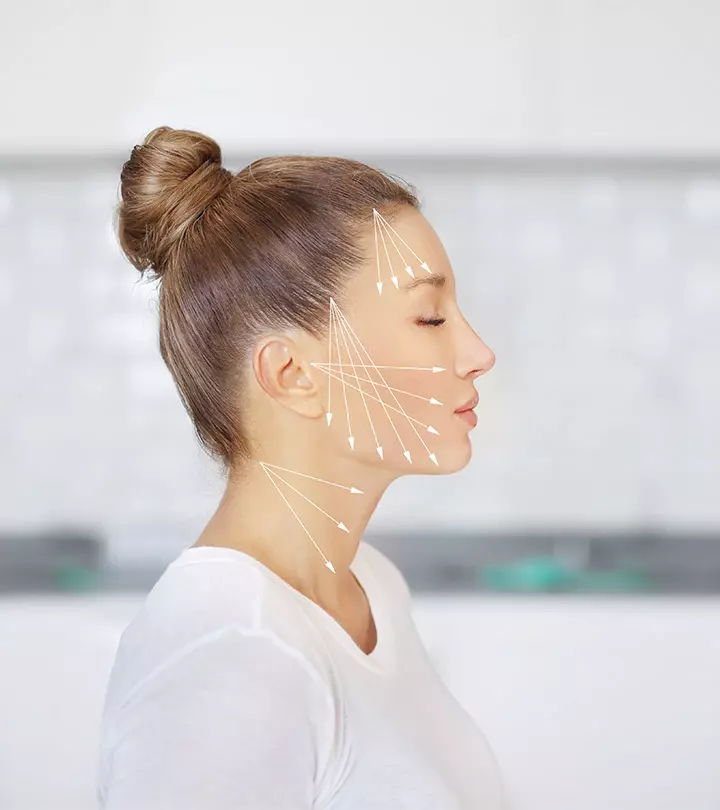
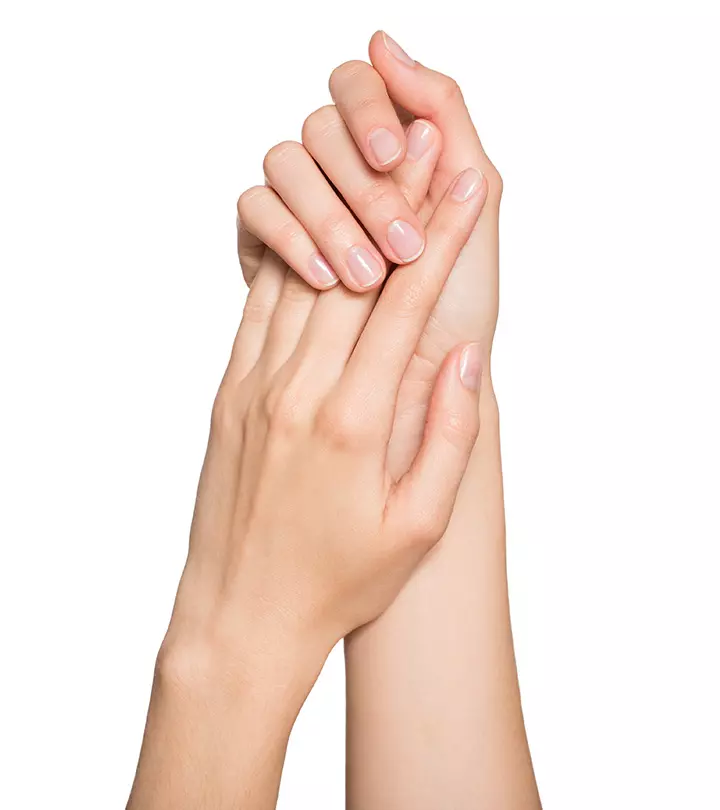

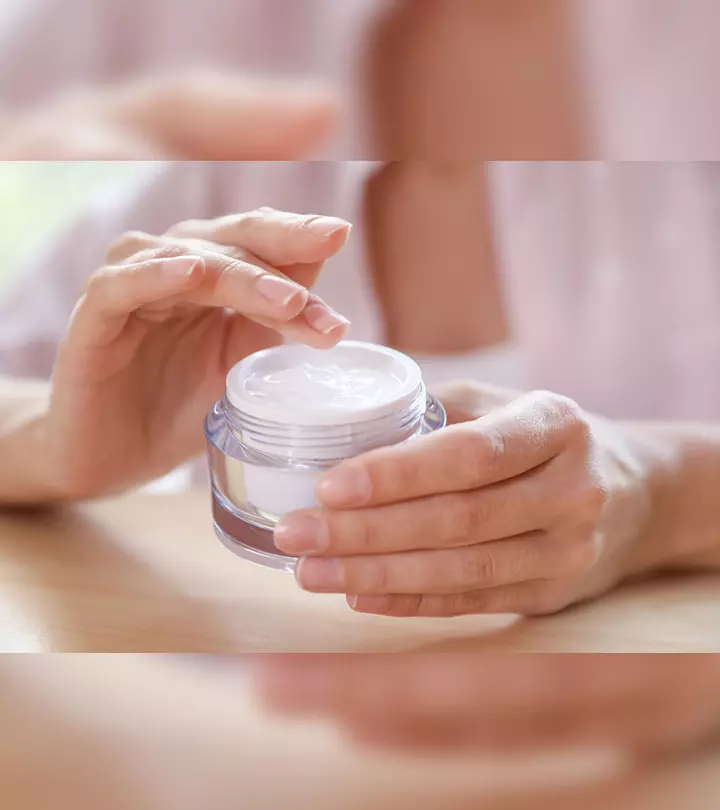
Community Experiences
Join the conversation and become a part of our empowering community! Share your stories, experiences, and insights to connect with other beauty, lifestyle, and health enthusiasts.